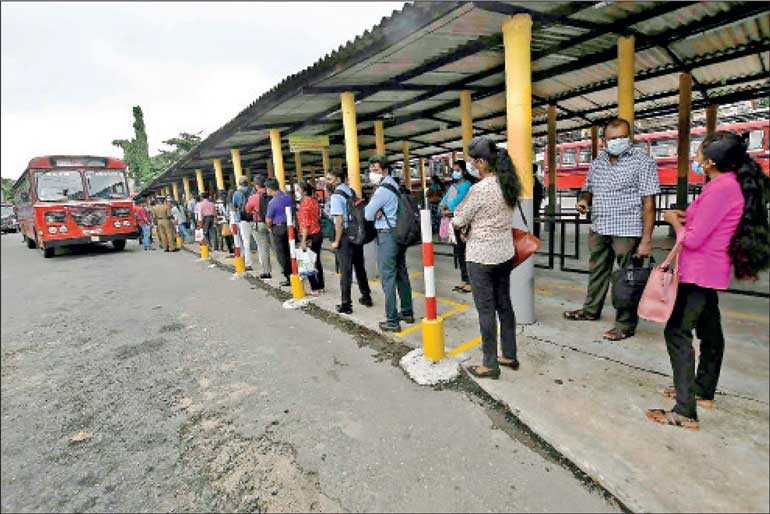Tuesday Feb 17, 2026
Tuesday Feb 17, 2026
Thursday, 14 May 2020 00:00 - - {{hitsCtrl.values.hits}}

Social distancing is just one of the four universal proximity distancing aspects brought into public focus by the
COVID-19 pandemic.
Ensuring all four may hold the key to a
societal transformation befitting Sri Lanka’s middle-income status while holding
COVID-19 at bay
The corona family has a nasty habit of waltzing back, and again! Sri Lanka may be prone to a resurgence of COVID-19 pandemic unless it re-draws public practice of personal space as the country belongs to a section of the global population where the line between personal and public space blurs dramatically, warns the Contingency Intelligence & Response Agency (CIRA).
Proximity Theory, a widely accepted narration of ‘space’ splits physical interactions into four types. They are Public Distance, Social Distance, Personal Distance and Intimate Distance with public distance considered at around two metres, social distance at around one metre, personal space at a foot and intimacy involving body contact. Societal tendencies throw open a scenario where human distancing is heavily influenced by socio-economic standards which amplifies into societal culture, explains developmental scientist Dr. Dinesh Watawana.
The area of concern is the habits of what constitutes the majority in Sri Lanka. The various manifestations were clearly evident during the lockdowns with stark contrasts in the habits of the people gathering at super markets vs. economic centres and non-graded shops, societal habits polarising by socio-economic standards.
The COVID-19 pandemic seems to have had a sobering effect on one section of society, alluding to the belief that higher on the socio-economical strata, people tend to project a more disciplined, cultured outlook even though the country as a whole is yet to project the kind of decorum seen in the developed world, Watawana said.
While there may be universal circumstances where accepted social norms are flouted, as in sports stadiums and entertainment venues, the developed world witnesses a deeper respect for social distancing than in less developed countries. With the new coronavirus wreaking havoc even in such advanced societies, scientists are watching with caution the fall out in societies disintegrated by poverty.
Recent developments where masses defied important public health instructions in clamouring for public transport also suggest yet another societal divide where health and safety may be considered less important at the lower end of the economic scale than the better-informed and more conservative middle income levels and further up the society.
While the economy needed to restart and people got back to livelihoods, it will be interesting to watch the employee turnout in offices, especially among young people who may be influenced to remain home while the pandemic remains at large. HR specialists have been warning even before the COVID-19 pandemic of Sri Lanka’s volatile employee culture with productivity and efficiency being touted as less competitive than other developing markets. In this light, it is imperative that Sri Lanka gets its re-opening right while at the same time, making good of the crisis-opportunity to instil public discipline and order. “Blurred lines of personal space have also encouraged rampant victimisation of women in public spaces and this must be considered as a golden opportunity to rectify the gender-based harassment. It is a perfect opening to advance societal development which match our label as a middle income-earning country, instilling public discipline which we see not just in the West but in some countries in the east like Singapore, Japan and Korea,” says Dr. Kala Oshadhi Peiris, a veteran gender and developmental specialist.
While it offers huge challenges in societal correction, CIRA believes that the pandemic has made people more attuned to public order and community health. The think-tank believes that the Government would do well to build on an impressive handling of the pandemic to instil a more disciplined society as just how the masses handle the re-opening may decide how well the economy finds traction while preventing a health debacle.
“We have been lamenting the missed chances that Singapore and Malaysia have built on. The COVID-19 debacle presents Sri Lanka the opportunity to correct-course,” says Dr. Watawana.
Instilling such lofty standards may not be easy as the urge to restore the old normal is high and will require a herculean effort at a time when the economy is at crossroads. For example, the public transport system already shows signs of buckling under the strain of social distancing and calls for massive investments and political will, but if not now, Sri Lanka might not get another shot at emulating developed societies in the foreseeable future.
CIRA has been advocating for a re-opening strategy based on geo-distancing where State and Private institutions re-arrange employee rosters based on where they live, creating work cells to complement work from home with provision to increase the number of cells and their size as per organisational requirements.
The strategy will encourage opportunity for people to work form their own hometowns without the need to travel to urban centres like Colombo, leading the way to building self-sustained localities throughout Sri Lanka, says Dr. Watawana.
As authorities struggle to present a viable solution to re-opening schools, the concept of geo-distancing, CIRA argues, will not only lend a practical way to mitigate the COVID-19 threat but also a framework for long-term mitigation of ill-effects of urbanisation, including traffic congestions, environmental pollution and inequality between cities and rural areas. Schools, especially larger and popular, could be split into satellites or cells taking a cue from the concept of private tuition where teachers and students go to school within their own home towns in a mixture of online studies and class rooms within a short radius, says CIRA.
Contingency Intelligence & Response Agency (CIRA) is a think-tank and catalyst for an overarching disaster response mechanism in SAARC countries bringing scientific research, international cooperation and private sector resources together in support of the governments to be ‘crisis-ready’.